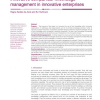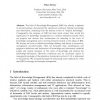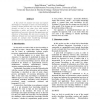103
click to vote
APAL
2005
15 years 1 months ago
2005
A new semantics is presented for the logic of proofs (LP), [1, 2], based on the intuition that it is a logic of explicit knowledge. This semantics is used to give new proofs of se...
113
click to vote
ECIS
2001
15 years 3 months ago
2001
Co-opetition, simultaneous co-operation and competition, is a recent phenomenon. Co-opetition entails sharing knowledge that may be a key source of competitive advantage. Yet, the...
113
click to vote
FLAIRS
2004
15 years 3 months ago
2004
This linguistically motivated work addresses issues in reasoning intelligently over spatial descriptions of simple, static scenes to produce plausible graphical interpretations. I...
124
click to vote
CASDMKM
2004
Springer
15 years 7 months ago
2004
Springer
The field of Knowledge Management (KM) has already completed its initiatory phase, characterized by operational confusion between knowledge and information, stemming from the tenuo...
107
click to vote
ER
2007
Springer
15 years 8 months ago
2007
Springer
Software systems embed in them knowledge about the domain in which they operate. However, this knowledge is “latent”. Making such knowledge accessible could be of great value ...
ICDIM
2008
IEEE
15 years 8 months ago
2008
IEEE
In this article we analyse how tacit and explicit knowledge are managed in teams. Tacit knowledge is located in human persons and it can not be described formally as data or any o...
OTM
2009
Springer
15 years 8 months ago
2009
Springer
As archives contain documents that span over a long period of time, the language used to create these documents and the language used for querying the archive can differ. This di�...
106
click to vote
ICCV
2001
IEEE
16 years 4 months ago
2001
IEEE
This paper presents a technique for blindly removing image non-linearities in the absence of any calibration information or explicit knowledge of the imagingdevice. The basic appr...



